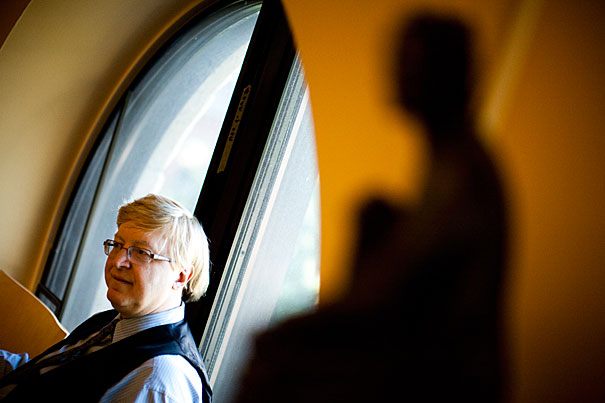
Newly tenured professor Nicolau Sevcenko fled with his parents from the Soviet Union to Brazil as a child. The language barrier and his parents’ refusal to discuss the circumstances that had brought them to Brazil contributed to his decision to become a historian. “More than anything else, I wanted to know what Brazil was, what Latin America was,” he said.
Stephanie Mitchell/Harvard Staff Photographer
Brazil’s public intellectual
Now a Harvard professor, Nicolau Sevcenko finds time to reflect
When Nicolau Sevcenko’s parents arrived in Brazil as political refugees — a destination chosen mostly because it was one of the few nations in the 1950s that accepted Soviet émigrés — they never imagined their newborn son would become perhaps the world’s leading authority on Brazilian cultural history.
Sevcenko was born in the coastal city of Santos while his family was en route to São Paolo to escape the turmoil of Europe after World War II. Once settled in Brazil, however, Sevcenko’s parents were reluctant to integrate into the culture. Convinced that the Soviet Union would soon collapse and they could return home, they made no effort to learn Portuguese, or to teach it to their young son.
The Harvard professor remembers sitting at the back of the classroom on his first day of school and not understanding a word that was said.
“I came home and told my mother that she had made a mistake and accidentally sent me to a foreign school,” said Sevcenko, who joined the Harvard faculty last year as a professor of Romance languages and literatures. But he quickly learned that he, in fact, was the foreigner.
Learning a new language and trying to navigate his position within Brazilian society were not the only obstacles Sevcenko faced growing up. He was born left-handed, but because left-handedness was considered a sin by his church, Sevcenko’s mother tied that hand behind his back, forcing him to become right-handed. Then, as a young adult, he was diagnosed as severely dyslexic.
Adding to his confusion was his parents’ refusal to discuss the circumstances that had brought them to Brazil.
“People would get very nervous if you ever mentioned the past or the word ‘communism,’ ” Sevcenko said. “It was very disturbing.”
Sevcenko’s desire to surmount this secrecy and understand his family’s story contributed to his decision to become a historian, and he sees his scholarly interests as a means of filling in the gaps and coming to terms with his own national identity.
“More than anything else, I wanted to know what Brazil was, what Latin America was,” he said.
While Sevcenko was navigating a difficult childhood and adolescence, all of Brazil was facing the turmoil of the military dictatorship that ruled the country from 1964 to 1985. This period was marked by severe censorship of books, movies, television shows, and music.
Ironically, because of this censorship, young people of Sevcenko’s generation became particularly interested in avant-garde cultural forms, and Sevcenko was exposed to experimental writing at an early age. His 1983 book on Rio de Janeiro’s “Belle Époque” at the beginning of the 20th century attracted widespread attention, his access to underground networks of banned cultural materials allowing him to present a vision of social and cultural life that challenged the party line of the waning military dictatorship.
Almost immediately after publication of this first book, Sevcenko rose to the status of public intellectual in Brazil. It’s a position he has maintained since: In addition to his academic writings, he has written for a number of newspapers and magazines on a diverse array of topics, ranging from theater and film to architecture and urban studies.
Sevcenko is often recognized on the street when in Brazil and is asked to comment on issues of public debate. He admits to enjoying his newfound anonymity in Cambridge, which allows him to walk unimpeded all over the city.
Sevcenko first came to Harvard, which he calls “the intellectual crossroads of the world,” as a visiting professor in 2004. Though he misses his wife, who remains in Brazil caring for his ailing mother and mother-in-law, Sevcenko expresses his delight at being at Harvard, not least because of the tranquility of Cambridge compared with São Paolo, a teeming metropolitan area of 20 million people.
“It’s an urban inferno,” he said of the city in which he had taught since 1983. “Changing from that into little Cambridge is just coming into paradise.”




